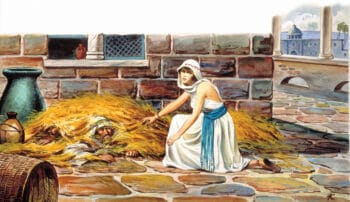Diana’s vow to never relive her mother’s suffering was shattered by her own painful marriage. After enduring the abuse and her husband’s controlling behavior, she chose to leave with her four children. What was next for Diana? Learn more at https://awr.org. Watch Diana’s full story: https://youtube.com/watch?v=EQNww5A2FrM #AWR360 MB017EUZ58YZPTX Source: https://www.youtube.com/shorts/t7mBxsbq9rU
SdS – Il libro di Giosuè – Lezione 02
SORPRESO DALLA GRAZIA.
Approfondimento della lezione 02 del 4° trimestre 2025 a cura di Mariarosa Cavalieri, Chiara Calabrini e Nicolò D'Elia. 📩 Trovi i materiali utili qui:
🔗 https://uicca.org/4-trimestre-2025-lezione-02
🔗https://uicca.org/nocciolo-4-trimestre-2025
🔗 https://uicca.org/edizioni-adv-4-trimestre-2025 Source: https://www.youtube.com/watch?v=2tJQZRWiKf4
The Darkness Diana Could Not Escape From
Diana’s life was marked by pain and brokenness. God knew just how to help her out of the darkness of her past. Learn more at awr.org. #AWR360 #BroadcastToBaptism MB01TWXRAU3ZOFC Source: https://www.youtube.com/shorts/9GcUUb0kMxI
Comments of the Week Sept 29-Oct 5

Comments of the Week Sept 29-Oct 5 “From this quote here we know what [Ellen White would] say. It is un-Christian and immoral to treat people the way our government is treating people right now.” -Kelvin Johnson on a quote from Ellen White Comments on Should Church Be Like a 12-step Group?, How to Make […] Source: https://atoday.org/comments-of-the-week-sept29-oct5/
Monday: Value in Unexpected Places
Daily Lesson for Monday 6th of October 2025
Read Joshua 2:2-11, Hebrews 11:31, and James 2:25. What do these texts tell us about Rahab?
Central to Rahab’s story is the lie told to protect the spies. In considering her lie, we have to realize that she was embedded in a society that was extremely sinful, which finally led to God’s decision to judge that society (Genesis 15:16, Deuteronomy 9:5, Leviticus 18:25-28). While it is true that the New Testament commends her faith, a careful analysis of the New Testament references to Rahab’s act reveals that none endorse everything about her, and none validate her lie.
Hebrews 11:31 confirms her faith in casting her lot with the spies instead of choosing to hold on to a corrupt culture. James 2:25 commends her offer of lodging to the two Israelite spies and for giving them directions on how to return by a safe route. In the middle of a decadent, corrupt culture and Rahab’s own sinful lifestyle, God, in His grace, saw a spark of faith through which He could save her. God used what was good in Rahab—which was manifest faith in Him and in her choice to belong to His people—but never commended everything she did. God valued Rahab for her exceptional courage, for her brave faith, for being an agent of salvation, and for choosing Israel’s God.
After seeing what was happening, she declared, “ ‘For the Lord your God, He is God in heaven above and on earth beneath’ ” (Joshua 2:11, NKJV). It’s significant to hear a Canaanite woman acknowledging that Yahweh is the only God, especially on a roof where, in her pagan religion, prayers were usually offered to what they believed were celestial deities.
The expression of Rahab is previously found only in the context of God’s exclusive right to receive worship (Exodus 20:4, Deuteronomy 4:39, Deuteronomy 5:8). Her words bear witness to a premeditated, conscientious choice to acknowledge that the God of the Israelites is the only true deity. Her confession demonstrates her understanding of the close relationship between God’s sovereignty and the judgment under which Jericho is doomed.
Her moral choice recognizes that, in light of Yahweh’s judgment, there were only two possibilities: to continue in rebellion against Him and be annihilated, or to choose to surrender in faith. By choosing the God of the Israelites, Rahab became an example of what could have been the destiny of all the inhabitants of Jericho had they turned to Israel’s God for mercy.
|
What does this story teach us about how God must have our ultimate allegiance? |
 (1)
(1)Source: https://ssnet.org/blog/25d-02-value-in-unexpected-places/
Y los dioses dieron dominio…

Oriente Medio vuelve a estar en guerra: Israel contra sus vecinos. La causa fundamental de ese conflicto es la creencia de Israel de que la tierra que conocemos como Palestina es una posesión que le ha sido otorgada por Dios, con exclusión de otros pueblos. En la antigüedad, muchos otros pueblos —kenitas, kenizitas, cadmonitas, hititas, […] Source: https://atoday.org/y-los-dioses-dieron-dominio/
Let Scripture Interpret Scripture
The Bible interprets itself. When you compare Scripture with Scripture, you find harmony, and when you confess honestly, the Holy Spirit confirms it with real freedom in Christ. Source: https://www.youtube.com/shorts/Te33HGax-lo
Adventist Hospital in Brazil Honored for Advancing Organ Donation and Transplantation
On September 22, 2025, the Pênfigo Adventist Hospital (HAP) received the “Friend of Transplant” Legislative Merit Award during a formal session in the Deputy Júlio Maia Plenary of the Mato Grosso do Sul State Legislative Assembly. Created by Reso… Source: https://adventist.news/news/adventist-hospital-in-brazil-honored-for-advancing-organ-donation-and-transplantation
Los comentarios del presidente de la División Sudasiática sobre ignorar las quejas de los miembros causan indignación

Chinta John Victor, el recién elegido presidente de la División Sudasiática, dijo en voz alta lo que todos pensaban en una reciente reunión celebrada en la Iglesia Harris Memorial de Hyderabad, India. El motivo de su sermón fue la toma de posesión de los nuevos oficiales de la Unión del Centro-Este de la India (ECIU). […] Source: https://atoday.org/los-comentarios-del-presidente-de-la-division-sudasiatica-sobre-ignorar-las-quejas-de-los-miembros-desatan-la-ira/
La División Interamericana de los Adventistas se moviliza contra el maltrato a las personas mayores con la campaña Enditnow

Miles de personas se reunieron en las regiones de la División Interamericana (IAD) como parte de una campaña activa de enditnow, una organización dedicada a reconocer y combatir la violencia doméstica. La organización adventista de base ha sido una poderosa defensora de los sobrevivientes de abusos, proporcionando herramientas de apoyo y educación sobre los primeros […] Source: https://atoday.org/la-division-interamericana-de-los-adventistas-se-moviliza-contra-el-maltrato-a-las-personas-mayores-con-la-campana-enditnow/
- « Previous Page
- 1
- …
- 201
- 202
- 203
- 204
- 205
- …
- 4858
- Next Page »


